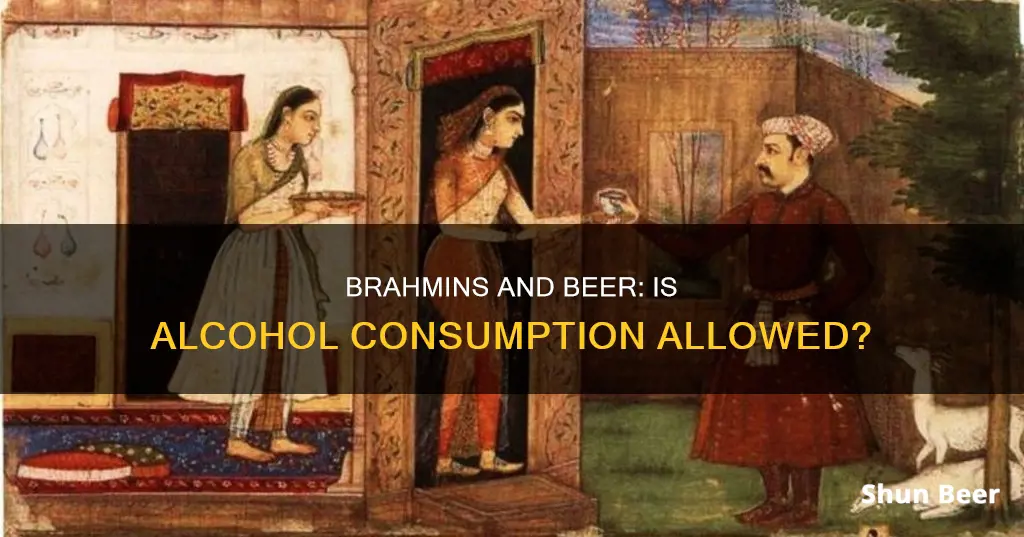
Alcohol consumption is a complex and multifaceted topic that varies across different religions and cultural contexts. When it comes to the question of whether Brahmins can drink beer, the answer is nuanced and depends on various factors. While some religious texts, such as the Parashara Smriti and Manusmriti, prohibit Brahmins from consuming alcohol, considering it a sin, other texts, like the Tantras, offer a different perspective. Additionally, the role of alcohol in religious rituals and the individual's personal choices also come into play.
| Characteristics | Values |
|---|---|
| Can Brahmins drink beer? | No, Brahmins cannot consume alcohol under normal circumstances. |
| Religious texts that prohibit alcohol consumption by Brahmins | The Parashara Smriti, Manusmriti, Chandogya Upanishad, Kathaka Samhita, Brahma Purana, Mahabharata, and the Bhavachudamoni-Tantra |
| Religious texts that encourage alcohol consumption | The Kamahya-Tantra, Niruttara-Tantra, and the Vishnu Smriti |
| Reasons for prohibition | Alcohol is considered to hinder Brahmins' ability to perform their duties as priests. |
| Modern perspectives | Contemporary Hinduism emphasizes individual choice and responsibility, rather than strict adherence to caste-based rules. |
What You'll Learn

Brahmins drinking alcohol in Hinduism
There are differing views on whether Brahmins are permitted to drink alcohol in Hinduism.
Some sources state that Brahmins are forbidden from consuming alcohol under normal circumstances. The Parashara Smriti, for instance, outlines the expiation of sins for a Brahman who has consumed alcohol. Similarly, the Chandogya Upanishad, one of the most authoritative Hindu scriptures, states that drinking alcohol is one of the five biggest sins.
Other sources, however, provide a more nuanced perspective. The Manusmriti, for example, suggests that while drinking alcohol is not a sin, abstention from it is conducive to great rewards. The Garuda Purana also acknowledges the potential benefits of alcohol when used judiciously, while cautioning against excessive consumption.
Additionally, the Vishnu Smrti differentiates between Brahmins and other castes, stating that while Brahmins should not drink alcohol, members of the other three Varnas (Kshatriyas, Vaishyas, and Shudras) commit no wrong in drinking intoxicating beverages.
The Brahmanda Purana also provides a detailed discussion on liquor consumption, allowing its use by the three castes (excluding Brahmin women) and prescribing specific atonements for those who drink unknowingly or excessively.
In conclusion, while some scriptures forbid alcohol consumption by Brahmins, others permit it under certain conditions or for other castes. The law of karma, which considers the impact of alcohol on decision-making and subsequent karma, may also be a relevant consideration for Brahmins contemplating alcohol consumption.
Beer and Zyrtec: Is It Safe to Mix?
You may want to see also

Drinking alcohol in other religions
Drinking alcohol is approached differently across various religions. Here is a summary of the stances on alcohol consumption in Hinduism, Buddhism, Christianity, and Islam.
Hinduism
In Hinduism, Brahmins are generally not allowed to consume alcohol under normal circumstances. The Parashara Smriti, a sacred Hindu text, states that a Brahman (a member of the highest caste) who consumes alcohol must perform a series of rituals to purify themselves. Other scriptures, such as the Chandogya Upanishad, also consider drinking alcohol as one of the five great sins. However, some Tantric traditions within Hinduism, such as the Kamahya-Tantra and the Niruttara-Tantra, advocate for the use of alcohol by Brahmins in Tantrik worship.
Buddhism
Buddhism has a diverse range of views on alcohol consumption. The fifth Buddhist precept, which forms the foundation of Buddhist ethics, calls on practitioners to "abstain from intoxicants that induce a state of carelessness." This precept is interpreted in different ways by various Buddhist traditions. Some Buddhist schools, like the Theravadin tradition, take a strict stance and abstain from all forms of intoxicants, including alcohol. On the other hand, traditions like Vajrayana Buddhism include the consumption of alcohol and meat in elaborate group rituals called vajra feasts, believing that it helps transform confusion into wisdom.
Christianity
Christian views on alcohol vary, but throughout most of Church history, Christians consumed alcoholic beverages as a common part of everyday life and used wine in their central rite, the Eucharist or Lord's Supper. They believe that alcohol, when used in moderation, is a gift from God that brings joy, but that over-indulgence leading to drunkenness is sinful. This view is supported by passages in the Bible, which presents alcohol as both a blessing and a potential danger. However, some Christian denominations, particularly Protestant churches like Methodists, advocate for abstentionism or prohibitionism, believing that not drinking alcohol is the wisest choice or that it is a sin.
Islam
In Islam, the consumption of alcohol is a complex topic. While the Quran does not explicitly prohibit alcohol consumption, it strongly discourages it, stating that "intoxicants, gambling, [sacrificing on] stone altars [to other than God], and divining arrows are but defilement from the work of Satan." Many Muslim-majority countries have strict laws regarding alcohol, with some banning it entirely. However, a minority of Muslims interpret the Quran differently and believe that consuming alcohol is not forbidden. Historically, Muslim elites consumed alcohol, and Muslim-majority countries continue to produce regional distilled beverages.
Beer and Bodybuilding: A Balancing Act?
You may want to see also

The role of alcohol in ancient societies
Alcohol has played a significant role in shaping human history, with its production and consumption deeply intertwined with social identity, politics, and cultural and religious practices in ancient societies. Here is an overview of the role of alcohol in ancient societies:
Social and Cultural Significance:
Alcoholic beverages were an integral part of social and cultural life in ancient times. In many societies, alcohol was consumed during rituals, feasts, and religious ceremonies. For example, the ancient Egyptians offered beer and wine to their gods, and alcoholic drinks were often used in rituals to honor the dead. Alcohol was also associated with social status, with certain beverages, like grape wine in ancient Rome, being reserved for the higher classes.
Health and Nutrition:
In a world where water supplies were often contaminated, alcoholic drinks provided a safer alternative. The antiseptic and antibacterial properties of alcohol made them less likely to carry waterborne diseases. Additionally, alcohol was believed to have medicinal properties and was used to treat various ailments in ancient societies. The Sumerian and Egyptian texts mentioned the medicinal use of alcohol as early as 2100 BC.
Economic and Political Factors:
The production and trade of alcoholic beverages also had economic and political implications. For example, the distribution of wine was an important source of income for the treasury in ancient China. Alcohol production and trade could shape political power and influence economic development within societies.
Technological Advancements:
The development of alcohol fermentation and distillation techniques played a crucial role in the advancement of ancient societies. The ability to produce alcoholic beverages led to the development of new technologies and knowledge in agriculture, chemistry, and biology. For example, the process of distillation was developed by Arab alchemists around AD 700 and later spread to Europe, leading to the production of spirits.
Social Norms and Moderation:
While alcohol was widely consumed, ancient societies also recognized the importance of moderation. Religious texts, such as the Hebrew Bible and the New Testament, often disapproved of drunkenness and encouraged temperance. Social norms around alcohol consumption varied across different cultures, with some societies, like the Babylonians, being critical of drunkenness without imposing any penalties.
A Day's Drinking: Beer Binge and Health
You may want to see also

Alcohol consumption in modern times
Alcohol consumption has been a part of human societies for thousands of years, and its role has evolved over time. In modern times, alcohol continues to hold an important place in social engagement and bonding for many people. While social drinking or moderate alcohol consumption can be pleasurable, excessive alcohol intake is linked to negative outcomes such as health issues, crime, road incidents, and alcohol dependence.
In the contemporary context, alcohol consumption patterns vary across different regions and cultures. For instance, alcohol intake is generally higher in Europe, while consumption across North Africa and the Middle East is notably lower. Income and cultural factors also influence drinking habits, with higher-income individuals in some countries tending to drink more frequently.
The role of alcohol in modern societies is complex and multifaceted. On the one hand, alcohol can facilitate social bonding, reduce inhibitions, and enhance certain social experiences. On the other hand, excessive alcohol consumption can lead to negative consequences, including health issues, social problems, and economic costs.
In terms of health impacts, alcohol is a risk factor for various diseases and contributes to premature deaths. Alcohol use disorder (AUD) refers to drinking that causes mental and physical health problems, and it affects a significant portion of the global population. Additionally, alcohol-impaired driving has led to road traffic accidents, injuries, and fatalities.
From a cultural perspective, conflicting attitudes towards drinking exist within and across societies. While some groups advocate for abstinence or moderate consumption, others view drinking as an integral part of their social and cultural traditions. These varying perspectives give rise to diverse regulations and approaches to controlling alcohol consumption, such as licensing systems, age restrictions, and taxation.
Overall, while alcohol consumption in modern times continues to serve social and cultural purposes, it also presents challenges that societies must address through a combination of educational initiatives, preventive measures, and treatment options.
Mixing Beer and Liquor: Safe or Not?
You may want to see also

The impact of alcohol on the body and mind
Alcohol can have a range of impacts on the body and mind, both in the short and long term. While an occasional drink is unlikely to cause health problems, regular drinking, even in moderation, can have more serious consequences.
Short-Term Effects
Alcohol is absorbed through the lining of the stomach and quickly spreads throughout the body. It reaches the brain in around five minutes and starts to affect cognitive functions within ten minutes. The first signs of intoxication can be felt within twenty minutes, and the liver starts processing alcohol at the same time.
The initial effects of alcohol include feelings of relaxation, drowsiness, euphoria, and giddiness. As more alcohol is consumed, there can be a loss of coordination, changes in hearing and vision, and impaired judgment and memory. This can lead to accidents, injuries, and decision-making that is later regretted.
Long-Term Effects
Regular alcohol consumption can lead to persistent changes in mood, including increased anxiety and irritability. It can also cause insomnia, a weakened immune system, changes in libido and sexual function, and weight gain or loss.
Chronic drinking can cause damage to the liver, heart, and pancreas. It can also affect the central nervous system, leading to numbness and tingling in the hands and feet. Alcohol use can also impact the ability to create long-term memories, make rational choices, and regulate emotions.
Cancer Risk
According to the National Cancer Institute, there is a clear link between alcohol consumption and an increased risk of developing certain types of cancer, including head and neck cancer, esophageal cancer, and breast cancer. The more alcohol a person drinks, the higher their risk of developing alcohol-associated cancer.
Pregnancy
Alcohol consumption during pregnancy can lead to miscarriage, stillbirth, or premature delivery. Children exposed to alcohol in the womb may experience learning difficulties, long-term health issues, and increased emotional problems.
Alcohol Withdrawal
Quitting alcohol can be challenging, and withdrawal symptoms can be dangerous and even life-threatening. These can include seizures, hallucinations, and delirium. It is recommended to seek medical advice before quitting alcohol, as sudden cessation may not always be safe.
Gluten Allergy and Beer: Is It Safe to Drink?
You may want to see also
Frequently asked questions
No, Brahmins are forbidden from drinking alcohol.
In Hinduism, Brahmins are forbidden from drinking alcohol due to their spiritual and religious responsibilities. Alcohol consumption is believed to hinder their ability to perform their duties effectively.
According to the Parashara Smriti, a Brahman who consumes alcohol must perform a Chandrayana and offer a feast and a cow and bull to the Brahmans as expiation. Additionally, drinking alcohol is considered one of the five great sins in Hinduism.
While Brahmins are generally prohibited from consuming alcohol, some Hindu sects, such as Tantra, allow for alcohol consumption during rituals if it is first offered to Goddess Shakti.







